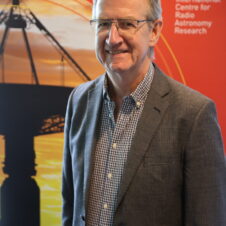Joint media statement from the Hon. Mark McGowan MLA, WA Premier and Hon. Dave Kelly MLA, WA Minister for Science.
“Western Australia’s top researchers and science communicators have been recognised overnight at the Premier’s Science Awards for 2017.
The awards, in their 16th year, are decided by a judging panel led by WA’s Chief Scientist, Professor Peter Klinken.
This year, two outstanding winners shared the $50,000 prize for Scientist of the Year:
- Professor Harvey Millar, Centre Director, Australian Research Council Centre of Excellence in Plant Energy Biology (The University of Western Australia); and
- Professor Christobel Saunders, Professor of Surgical Oncology, Head, Division of Surgery (The University of Western Australia).
Other winners were:
- Dr Asha Bowen – Woodside Early Career Scientist of the Year ($10,000);
- David Gozzard – ExxonMobil Student Scientist of the Year ($10,000); and
- CoderDojo WA – Chevron Science Engagement Initiative of the Year ($10,000).
Emeritus Professor John Pate was inducted into the WA Science Hall of Fame in recognition of his decades-long career in plant ecology and physiology, which has greatly informed the knowledge of flora in WA.
ExxonMobil, Chevron and Woodside have sponsored the awards since 2013. Supporting the awards ceremony this year were WA’s five universities.
For more information, visit http://www.jtsi.wa.gov.au/premiersscienceawards”
Congratulations to our own UWA School of Physics/ICRAR PhD Candidate David Gozzard for his win as student scientist of the year! David’s studies are with the School of Physics and Astrophysics at The University of Western Australia.
2017 Premier’s Science Awards – Winner Profiles
Scientist of the Year
Professor Harvey Millar (Kingsley)
Centre Director, Australian Research Council (ARC) Centre of Excellence in Plant Energy Biology (The University of Western Australia)
Professor Millar is an award-winning leader in plant science research with a focus on the function of proteins that enhance the energy efficiency of plants in harsh environments. His novel research on wheat and barley is opening new opportunities in crop improvement directly relevant to Western Australian industries. Professor Millar is the National Director of the ARC Centre of Excellence in Plant Energy Biology (PEB) which is headquartered at UWA. Under his leadership, PEB now boasts the world’s largest concentration of specialist researchers in the energy efficiency of plants and leads its Australian activities from WA.
Professor Christobel Saunders (Fremantle)
Professor of Surgical Oncology, Head, Division of Surgery (The University of Western Australia)
Professor Saunders is a Consultant Surgeon at Royal Perth, St John of God and Fiona Stanley hospitals, and Professor of Surgical Oncology at UWA. She is a leader in surgical practice and cancer research in Australia and internationally. She has a particular research interest in breast cancer including clinical trials of new treatments, supportive care, and translational and health services research which have led to better treatments for people with cancer and improved survival. Professor Saunders is directly involved in strategic planning of Australian cancer services and research through her senior roles on numerous cancer boards, networks and taskforces.
Woodside Early Career Scientist of the Year
Dr Asha Bowen (Wembley)
National Health and Medical Research Council (NHMRC) Early Career Fellow (Telethon Kids Institute)
Dr Bowen is a clinician-NHMRC early career researcher at Telethon Kids Institute and Paediatric Infectious Diseases specialist at Princess Margaret Hospital. As leader of the Telethon Kids Institute Skin Team, Dr Bowen uses an integrated approach to reduce the burden of skin infections in Aboriginal children. Dr Bowen’s PhD was a world-first trial of the treatment of impetigo (a skin disease which can lead to life-threatening conditions) in remote Aboriginal children. The trial results have been translated into local, regional and national treatment guidelines. Dr Bowen is also leading the first comprehensive skin control program for WA, which aims to halve the incidence of skin infections in Kimberley Aboriginal children.
ExxonMobil Student Scientist of the Year
Mr David Gozzard (Wembley Downs)
PhD candidate (The University of Western Australia)
Mr Gozzard is completing a PhD in experimental physics, developing stabilised transmission systems to send atomic clock signals over long distances with improved precision. This research has direct application to the Square Kilometre Array project and the Atomic Clock Ensemble in Space mission. His research has required significant collaboration with major national and international research organisations. Mr Gozzard has had success at numerous national and international science competitions and devotes considerable efforts to science outreach. Mr Gozzard promotes science to school and university students through presentations, demonstrations and social media, as well as through direct involvement with Astrofest and the Gravity Discovery Centre.
Chevron Science Engagement Initiative of the Year
CoderDojo WA
(Fogarty Foundation)
CoderDojo WA is the WA node of CoderDojo, an open source network of fun, free and social computer programming clubs, Dojos, for young people aged seven to 17. The international CoderDojo movement was founded to address the looming world-wide shortage of computer programmers and highly skilled ICT professionals. The Fogarty Foundation initiated the CoderDojo WA network by launching the State’s first Dojo in 2013. Since then, the WA network has expanded to more than 100 WA Dojos. As a result, more than 2,000 young Western Australians have been able to access opportunities to learn computer programming and develop their digital skills.
2017 WA Science Hall of Fame – Inductee Profile
Emeritus Professor John Pate (Denmark)
(The University of Western Australia)
Professor John Stewart Pate has greatly influenced plant sciences, particularly plant ecology and physiology, in WA. The major thrust of his work concerned the carbon and nitrogen economies of plants, especially legumes, and contributed to applied research on productivity of pastures and crops. He was head of the botany department at The University of Western Australia from 1974 to 1986 and taught many undergraduate and post-graduate students. Professor Pate’s scientific career was honoured by election to the Australian Academy of Sciences in 1980 and to the Royal Society, London in 1985. Honorary degrees and medals have also recognised his contribution to plant science and environmental issues.

